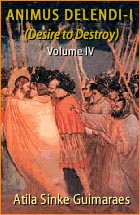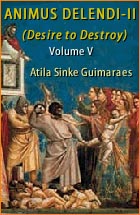Catholic Virtues
 |
 |
 |
 |
 |
 |
 |
Sermon for the 2nd Sunday after Easter
The Government of the Good Shepherd
In the middle of Paschal Time, the Church gives us the parable of the Good Shepherd or, literally, the "Handsome Shepherd," because the Greek text says kalós (καλός) and not agathós (ἀγαθός). Obviously beauty, goodness and truth are identifiable with one another, so the title of Good Shepherd is appropriate.
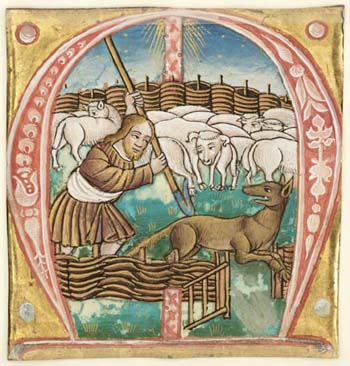 This is the most personal parable Christ gave us or, rather, the only personal one in which He describes himself. In the other parables Christ speaks of God the Father: In them He is "the Son," the one the Father sends to the bad employees and who is killed by them.
This is the most personal parable Christ gave us or, rather, the only personal one in which He describes himself. In the other parables Christ speaks of God the Father: In them He is "the Son," the one the Father sends to the bad employees and who is killed by them.
But this parable begins with the pronoun I: "I am the Good Shepherd."
It is noteworthy that this is His portrait and, through it, Christ implicitly says that He is God: for that expression “I AM” directly refers to the Yahweh that Moses heard on Sinai. Also, the name of "Shepherd" is attributed to Yahweh by the Prophets. Here Christ applies this expression to himself, and even takes some verses from Isaiah, Ezekiel and Zachariah.
And He inserts a personal addition, saying one thing about himself that the Prophets could not say about God: "The Good Shepherd gives His life for His sheep," which is the ultimate proof of love, as He said elsewhere.
When Christ decided to institute His Church, He took the disciples to a city called Caesarea Philippi, the City of Cesar.
During the Greek period, Caesarea Philippi was called Paneias (Πανειάς) due to its association with the false god Pan (Baal Gad). This false god was represented as half-man and half-goat and was considered the god of lasciviousness and debauchery. From his name is derived the word “panic.” The whole city was filled with altars honoring Pan.
In the year 3 BC, Philip II the Tetrarch decided to transform the city into the administrative capital of his large tetrarchy. So, spiritually and temporally, it was a very important city. In that precise city, surrounded by images of false gods and confronting the power of the emperor who pretended to be adored as God, Christ asked His disciples who they believed He was. And St. Peter, as a head of the Apostles, recognized Him as Christ, which implies that He was God and King to rule over the spiritual and temporal aspects of human society. This has been the constant teaching of the Church .
Christ's rule on earth before His Ascension
And how does Christ rule society? Like a Shepherd.
In the 40 days of apparitions before His Ascension, Christ assumes the role of comforter, as Saint Ignatius affirms; that is to say, He rules as a Good Shepherd and Magnanimous King. He did not rebuke the Apostles who had abandoned Him in His Passion because He saw that they were repentant. Only to St. Peter, who was the head, does Christ ask for a retraction of his three denials, but he does so in a kindly way: "Do you love Me more than these others?" – a question that was possibly also a test.
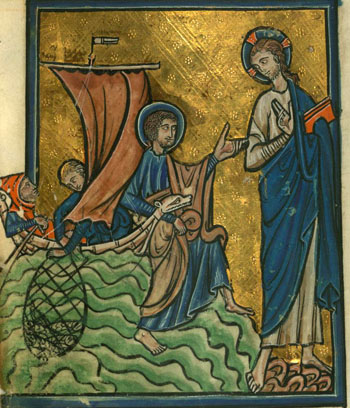 For the braggart Peter would have answered before without hesitation: "Yes, Lord; I love Thee more than anyone,” as in fact he had already done: Remember what he said that Holy Thursday night: "Although all shall be scandalized in Thee, I will never be scandalized." But the converted Peter responds, perhaps with tears: "Lord, Thou knowest all things: Thou knowest that I love Thee." But now He does not say "more than anyone." He passed the test.
For the braggart Peter would have answered before without hesitation: "Yes, Lord; I love Thee more than anyone,” as in fact he had already done: Remember what he said that Holy Thursday night: "Although all shall be scandalized in Thee, I will never be scandalized." But the converted Peter responds, perhaps with tears: "Lord, Thou knowest all things: Thou knowest that I love Thee." But now He does not say "more than anyone." He passed the test.
So, this will be the government of Christ in this world and the world to come. "The Politics of God and the Government of Christ," as Quevedo said. Don Francisco de Quevedo y Villegas wrote a book on Christian Politics, precisely with that title. In it he described the politics of Christianity when it was already lost in some nations, and when it was beginning to become lost in Spain.
Quevedo recalls with longing the old government, the politics of Christianity, that is, the government and politics of Christ. And for whom did Quevedo write? For posterity. But posterity has ignored him. Let us say instead that he wrote for eternity, for which all the great thinkers write.
And if we talk about great thinkers, I cannot fail to mention one of the greatest Catholic thinkers of the last century, Prof. Plinio Corrêa de Oliveira, who dedicated his entire life to the defense of the Kingship of Christ and the rights of His Church in human society.
His conception of Christian politics is nothing else but the application of the principles of the Gospel in society. Principles that are translated into the human community based on two main concepts: the hierarchical order and the harmonious sacredness or sacrality of the Kingdom of Christ.
A profoundly anti-egalitarian order
Certainly, in order to contemplate God we must contemplate the order established by Him. This order is profoundly anti-egalitarian, that is, it is hierarchical. St. Thomas Aquinas describes this concept in a certain way in his Summa Theologica (P. I, q. 2, a. 3), when he talks about the "five ways" (quinque viae). In the cosmos (κόσμος) (which in Greek means "order"), the happiness of the human being is a response of fidelity to the vocation to which the Creator calls him. This is nothing else than the path to holiness.
A few days ago, speaking about vocation, someone gave me an excellent example: The most perfect human creature created by God was a woman, Our Lady, and she passed her whole life doing in silence and with humility what a mother does in her home. The path to holiness in the vocation of the spouse and mother.
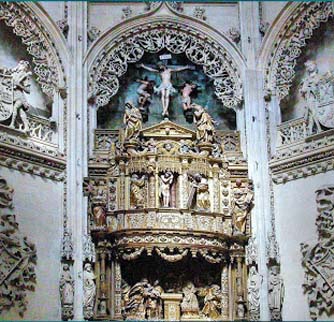 Once we understand this, we can appreciate the sacredness of all that surrounds us, and mainly the sacredness of the organic structure of Christian society, which is the only acceptable structure established for the salvation of the human being. For Christian society par excellence is the Church, and, as we know, outside the Church there is no salvation. Extra ecclesiam nulla salus.
Once we understand this, we can appreciate the sacredness of all that surrounds us, and mainly the sacredness of the organic structure of Christian society, which is the only acceptable structure established for the salvation of the human being. For Christian society par excellence is the Church, and, as we know, outside the Church there is no salvation. Extra ecclesiam nulla salus.
This is why no Catholic can grant any right to error, to heresy, to false religions. Imagine if we put health and sickness, truth and falsehood, wisdom and ignorance on the same level.
How can we believe then in a revolutionary democracy that says that power emanates from the people and not from God? Impossible. How can a Christian accept that the vote of a criminal is equal to that of an honorable man? How can he admit as something good that temples are being built to worship Satan, justifying it in the name of religious freedom and democratic principles? To put the State and its demagogic tyranny over Christ is the same thing that the Jews did when they rejected the Kingship of Christ, shouting: “We have no king but Caesar.”
This is the schizophrenia of the modern world and, more than schizophrenia, it is the impulse of thanatos, that is, the death drive, as it was called by a madman who knew a lot about perversity and whose name I won’t mention here. It is the longing for suicide that today gnaws at neoliberal Europe.
And what is Liberalism? Liberalism is the idea that stupidity deserves a fair chance. It is like a doctor who tells his patient: "Excuse me, but we can't give you this medicine because it would make your cancer disappear, and the cancer also has the right to exist." ... Ridiculous, right?
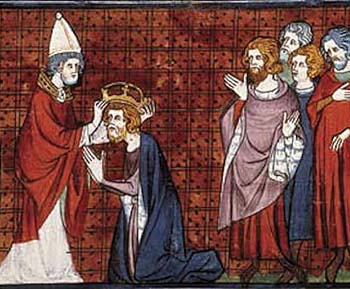 This is why Prof. Plinio spoke in his time of a necessary fight for a Counter-Revolution, to seek a return to that sacredness of society, honor, dignity, traditions, in short, to the order established by God in which the Church has supremacy over the temporal order.
This is why Prof. Plinio spoke in his time of a necessary fight for a Counter-Revolution, to seek a return to that sacredness of society, honor, dignity, traditions, in short, to the order established by God in which the Church has supremacy over the temporal order.
In short, the government described by Quevedo and Prof. Plinio is simply the government of the Good Shepherd.
We can only continue to pray to God for this great restoration so that his Kingdom may come to us, because only He can give a solution to the crisis in which we find ourselves today.
We can, however, do something else: We can govern ourselves in our small organic society through the politics of God and the government of Christ, which is the government of the justice, charity and beauty of the “Handsome Shepherd.” We can strive to have in our souls a thirst for justice, a continuous relationship with God through charity and the admiration of beauty. Such things can be accomplished even by the humblest of us.
In these times of the catacombs, let us focus our efforts on the circle of our family so that He may Reign in it and preserve it from the blight of error and corruption. King and Shepherd, son of David – who also was a shepherd and king – let Thy mercy be upon us, as we have hoped in Thee. And, as the Hebrew psalm says “guide us through the valley of death, in Thy company and under Thy staff, we shall fear no evil" (גַּ֤םכִּֽי־אֵלֵ֨ךְבְּגֵ֪יאצַלְמָ֡וֶתלֹא־אִ֘ירָ֤ארָ֗עכִּי־אַתָּ֥העִמָּדִ֑ישִׁבְטְךָ֥וּ֝מִשְׁעַנְתֶּ֗ךָ).
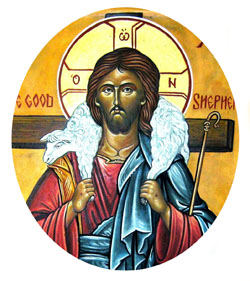


Christ portrayed as the Good Shepherd
in a medieval manuscript
But this parable begins with the pronoun I: "I am the Good Shepherd."
It is noteworthy that this is His portrait and, through it, Christ implicitly says that He is God: for that expression “I AM” directly refers to the Yahweh that Moses heard on Sinai. Also, the name of "Shepherd" is attributed to Yahweh by the Prophets. Here Christ applies this expression to himself, and even takes some verses from Isaiah, Ezekiel and Zachariah.
And He inserts a personal addition, saying one thing about himself that the Prophets could not say about God: "The Good Shepherd gives His life for His sheep," which is the ultimate proof of love, as He said elsewhere.
When Christ decided to institute His Church, He took the disciples to a city called Caesarea Philippi, the City of Cesar.
During the Greek period, Caesarea Philippi was called Paneias (Πανειάς) due to its association with the false god Pan (Baal Gad). This false god was represented as half-man and half-goat and was considered the god of lasciviousness and debauchery. From his name is derived the word “panic.” The whole city was filled with altars honoring Pan.
In the year 3 BC, Philip II the Tetrarch decided to transform the city into the administrative capital of his large tetrarchy. So, spiritually and temporally, it was a very important city. In that precise city, surrounded by images of false gods and confronting the power of the emperor who pretended to be adored as God, Christ asked His disciples who they believed He was. And St. Peter, as a head of the Apostles, recognized Him as Christ, which implies that He was God and King to rule over the spiritual and temporal aspects of human society. This has been the constant teaching of the Church .
Christ's rule on earth before His Ascension
And how does Christ rule society? Like a Shepherd.
In the 40 days of apparitions before His Ascension, Christ assumes the role of comforter, as Saint Ignatius affirms; that is to say, He rules as a Good Shepherd and Magnanimous King. He did not rebuke the Apostles who had abandoned Him in His Passion because He saw that they were repentant. Only to St. Peter, who was the head, does Christ ask for a retraction of his three denials, but he does so in a kindly way: "Do you love Me more than these others?" – a question that was possibly also a test.

Christ appears to the Apostles on Lake Tiberias
So, this will be the government of Christ in this world and the world to come. "The Politics of God and the Government of Christ," as Quevedo said. Don Francisco de Quevedo y Villegas wrote a book on Christian Politics, precisely with that title. In it he described the politics of Christianity when it was already lost in some nations, and when it was beginning to become lost in Spain.
Quevedo recalls with longing the old government, the politics of Christianity, that is, the government and politics of Christ. And for whom did Quevedo write? For posterity. But posterity has ignored him. Let us say instead that he wrote for eternity, for which all the great thinkers write.
And if we talk about great thinkers, I cannot fail to mention one of the greatest Catholic thinkers of the last century, Prof. Plinio Corrêa de Oliveira, who dedicated his entire life to the defense of the Kingship of Christ and the rights of His Church in human society.
His conception of Christian politics is nothing else but the application of the principles of the Gospel in society. Principles that are translated into the human community based on two main concepts: the hierarchical order and the harmonious sacredness or sacrality of the Kingdom of Christ.
A profoundly anti-egalitarian order
Certainly, in order to contemplate God we must contemplate the order established by Him. This order is profoundly anti-egalitarian, that is, it is hierarchical. St. Thomas Aquinas describes this concept in a certain way in his Summa Theologica (P. I, q. 2, a. 3), when he talks about the "five ways" (quinque viae). In the cosmos (κόσμος) (which in Greek means "order"), the happiness of the human being is a response of fidelity to the vocation to which the Creator calls him. This is nothing else than the path to holiness.
A few days ago, speaking about vocation, someone gave me an excellent example: The most perfect human creature created by God was a woman, Our Lady, and she passed her whole life doing in silence and with humility what a mother does in her home. The path to holiness in the vocation of the spouse and mother.

Hierarchy & sacrality reflected in Burgos Cathedral
This is why no Catholic can grant any right to error, to heresy, to false religions. Imagine if we put health and sickness, truth and falsehood, wisdom and ignorance on the same level.
How can we believe then in a revolutionary democracy that says that power emanates from the people and not from God? Impossible. How can a Christian accept that the vote of a criminal is equal to that of an honorable man? How can he admit as something good that temples are being built to worship Satan, justifying it in the name of religious freedom and democratic principles? To put the State and its demagogic tyranny over Christ is the same thing that the Jews did when they rejected the Kingship of Christ, shouting: “We have no king but Caesar.”
This is the schizophrenia of the modern world and, more than schizophrenia, it is the impulse of thanatos, that is, the death drive, as it was called by a madman who knew a lot about perversity and whose name I won’t mention here. It is the longing for suicide that today gnaws at neoliberal Europe.
And what is Liberalism? Liberalism is the idea that stupidity deserves a fair chance. It is like a doctor who tells his patient: "Excuse me, but we can't give you this medicine because it would make your cancer disappear, and the cancer also has the right to exist." ... Ridiculous, right?

Pope Leo crowns Charlemagne, signifying the supremacy of the Church over temporal society
In short, the government described by Quevedo and Prof. Plinio is simply the government of the Good Shepherd.
We can only continue to pray to God for this great restoration so that his Kingdom may come to us, because only He can give a solution to the crisis in which we find ourselves today.
We can, however, do something else: We can govern ourselves in our small organic society through the politics of God and the government of Christ, which is the government of the justice, charity and beauty of the “Handsome Shepherd.” We can strive to have in our souls a thirst for justice, a continuous relationship with God through charity and the admiration of beauty. Such things can be accomplished even by the humblest of us.
In these times of the catacombs, let us focus our efforts on the circle of our family so that He may Reign in it and preserve it from the blight of error and corruption. King and Shepherd, son of David – who also was a shepherd and king – let Thy mercy be upon us, as we have hoped in Thee. And, as the Hebrew psalm says “guide us through the valley of death, in Thy company and under Thy staff, we shall fear no evil" (גַּ֤םכִּֽי־אֵלֵ֨ךְבְּגֵ֪יאצַלְמָ֡וֶתלֹא־אִ֘ירָ֤ארָ֗עכִּי־אַתָּ֥העִמָּדִ֑ישִׁבְטְךָ֥וּ֝מִשְׁעַנְתֶּ֗ךָ).

Posted April 16, 2017






